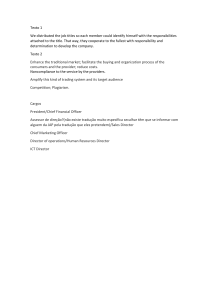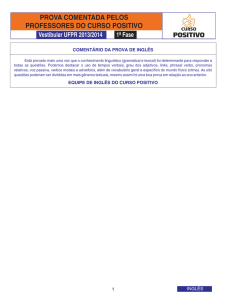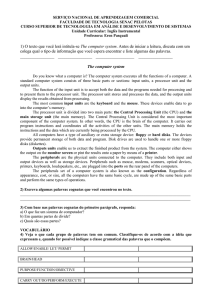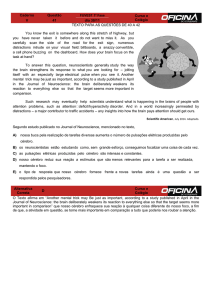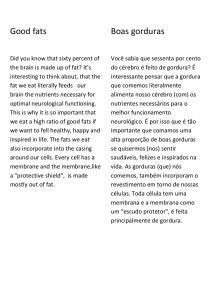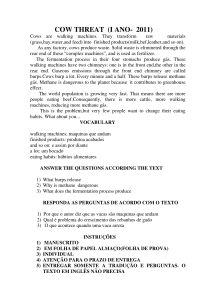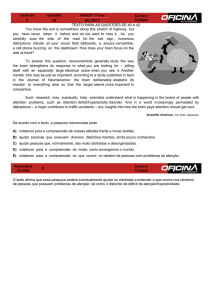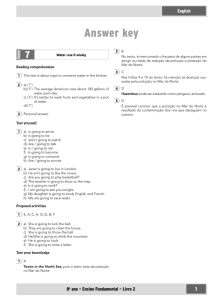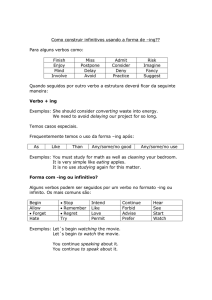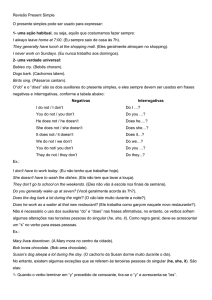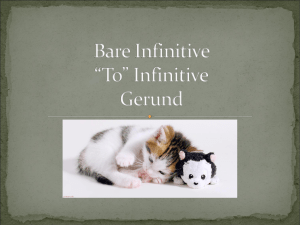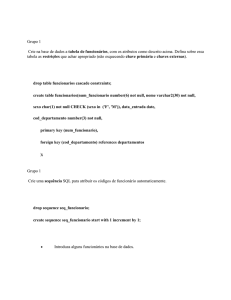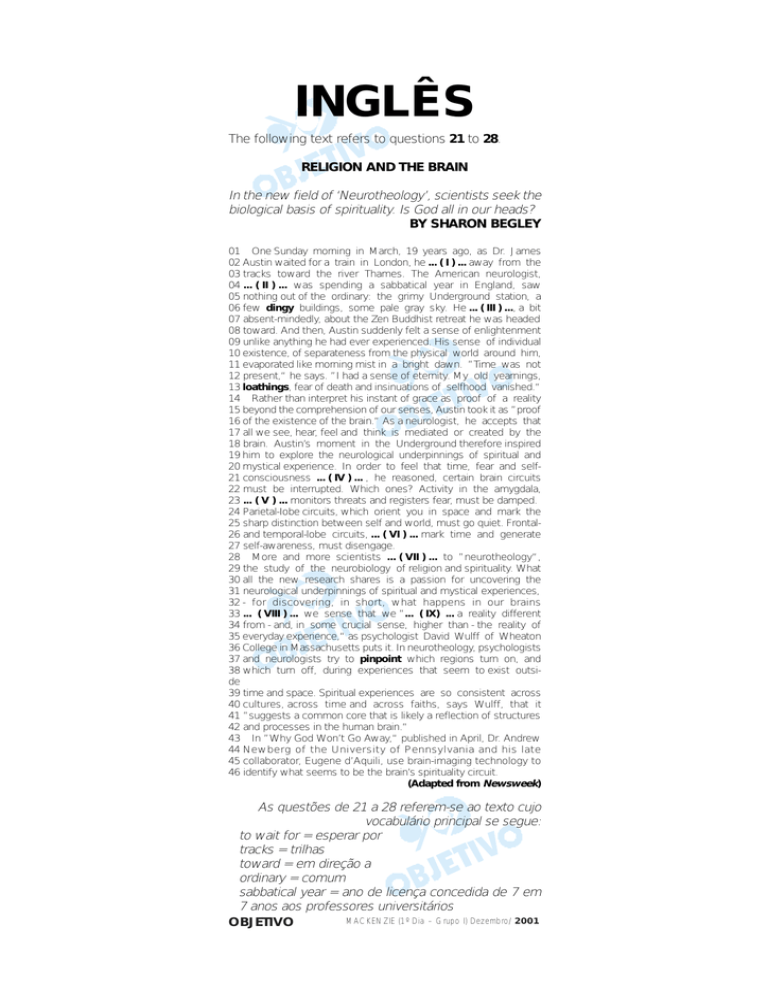
INGLÊS
The following text refers to questions 21 to 28.
RELIGION AND THE BRAIN
In the new field of ‘Neurotheology’, scientists seek the
biological basis of spirituality. Is God all in our heads?
BY SHARON BEGLEY
01 One Sunday morning in March, 19 years ago, as Dr. James
02 Austin waited for a train in London, he ... ( I ) ... away from the
03 tracks toward the river Thames. The American neurologist,
04 ... ( II ) ... was spending a sabbatical year in England, saw
05 nothing out of the ordinary: the grimy Underground station, a
06 few dingy buildings, some pale gray sky. He ... ( III ) ..., a bit
07 absent-mindedly, about the Zen Buddhist retreat he was headed
08 toward. And then, Austin suddenly felt a sense of enlightenment
09 unlike anything he had ever experienced. His sense of individual
10 existence, of separateness from the physical world around him,
11 evaporated like morning mist in a bright dawn. ”Time was not
12 present,“ he says. ”I had a sense of eternity. My old yearnings,
13 loathings, fear of death and insinuations of selfhood vanished.“
14 Rather than interpret his instant of grace as proof of a reality
15 beyond the comprehension of our senses, Austin took it as ”proof
16 of the existence of the brain.“ As a neurologist, he accepts that
17 all we see, hear, feel and think is mediated or created by the
18 brain. Austin’s moment in the Underground therefore inspired
19 him to explore the neurological underpinnings of spiritual and
20 mystical experience. In order to feel that time, fear and self21 consciousness ... ( IV ) ... , he reasoned, certain brain circuits
22 must be interrupted. Which ones? Activity in the amygdala,
23 ... ( V ) ... monitors threats and registers fear, must be damped.
24 Parietal-Iobe circuits, which orient you in space and mark the
25 sharp distinction between self and world, must go quiet. Frontal26 and temporal-lobe circuits, ... ( VI ) ... mark time and generate
27 self-awareness, must disengage.
28 More and more scientists ... ( VII ) ... to ”neurotheology“,
29 the study of the neurobiology of religion and spirituality. What
30 all the new research shares is a passion for uncovering the
31 neurological underpinnings of spiritual and mystical experiences,
32 - for discovering, in short, what happens in our brains
33 ... ( VIII ) ... we sense that we ”... ( IX) ... a reality different
34 from - and, in some crucial sense, higher than - the reality of
35 everyday experience,“ as psychologist David Wulff of Wheaton
36 College in Massachusetts puts it. In neurotheology, psychologists
37 and neurologists try to pinpoint which regions turn on, and
38 which turn off, during experiences that seem to exist outside
39 time and space. Spiritual experiences are so consistent across
40 cultures, across time and across faiths, says Wulff, that it
41 ”suggests a common core that is likely a reflection of structures
42 and processes in the human brain.“
43 In ”Why God Won’t Go Away,“ published in April, Dr. Andrew
44 Newberg of the University of Pennsylvania and his late
45 collaborator, Eugene d’Aquili, use brain-imaging technology to
46 identify what seems to be the brain’s spirituality circuit.
(Adapted from Newsweek)
As questões de 21 a 28 referem-se ao texto cujo
vocabulário principal se segue:
• to wait for = esperar por
• tracks = trilhas
• toward = em direção a
• ordinary = comum
• sabbatical year = ano de licença concedida de 7 em
7 anos aos professores universitários
MACKENZIE (1º Dia – Grupo I) Dezembro/2001
OBJETIVO
• grimy = sinistra
• underground station = estação de metrô
• a few = poucos
• dingy = sujos, lúgubres
• buildings = prédios
• pale gray sky = céu de cor cinza pálido
• a bit absent-mindedly = um pouco distraído
• retreat = retiro
• to head toward = ir em direção a
• suddenly = de repente
• to feel (felt, felt) = sentir
• enlightenment = esclarecimento
• unlike anything = diferente de tudo
• sense = senso, sentido
• morning mist = névoa da manhã
• bright dawn = aurora brilhante
• yearnings = anseios
• loathings = ódios
• fear of death = medo da morte
• selfhood = individualidade
• to vanish = sumir, desaparecer
• rather than = em vez de
• proof = prova
• beyond = além
• brain = cérebro
• to accept = aceitar
• to hear = ouvir
• underpinnings = bases
• in order to = com a finalidade de
• therefore = portanto
• self-consciousness = constrangimento
• to reason = raciocinar
• threats = ameaças
• to damp = enfraquecer
• sharp = nítida
• between = entre
• to generate = gerar
• self-awareness = autoconscientização
• to disengage = desimpedir
• research = pesquisa
• to share = compartilhar
• passion = paixão
• to uncover = revelar
• to discover = descobrir
• in short = em poucas palavras
• higher than = maior que
• to pinpoint = apontar
• to try = tentar
• to turn on/off = ligar/desligar
• during = durante
• to seem = parecer
• outside = fora
• so = tão
• across = através (de)
• faiths = credos
• core = centro, núcleo, essência
• likely = provavelmente
• to publish = publicar
• late = falecido
MACKENZIE (1º Dia – Grupo I) Dezembro/2001
OBJETIVO
21 c
As lacunas I, III e VII devem ser preenchidas respectiva e corretamente por:
a) is glancing; thinks; are flocking
b) glances; thought; has flocked
c) glanced; was thinking; have flocked
d) has been glancing; have thought; flocks
e) has glanced; were thinking; had being flocking
Resolução
• to glance (= avistar) → verbo regular usado no
Simple Past
• to think (= pensar) → verbo usado no Past
Continuous
• to flock (= juntar-se) → verbo usado no Simple
Present Perfect
22 b
As lacunas II, V, VI e VIII devem ser preenchidas respectiva e corretamente por:
a) that; who; when; what
b) who; which; which; when
c) when; where; that; whose
d) which; that; whose; where
e) whom; who; where; which
Resolução
Uso de Relativos:
• WHO → referente ao antecedente “pessoa”
(= the American neurologist)
• WHICH → referente ao antecedente “coisa”
(= amygdala)
• WHICH → referente ao antecedente “coisa”
(= temporal-lobe circuits)
• WHEN → uso do relativo “quando”
23 e
As lacunas IV e IX devem ser preenchidas respectiva e
corretamente por:
a) is dissolving; encounters
b) is being dissolving; are encountering
c) dissolved; has encountered
d) dissolves; have being encountering
e) have dissolved; have encountered
Resolução
• Uso de 2 verbos regulares no Simple Present Perfect
Tense (have + past participle): o verbo to dissolve na
3ª pessoa do plural; o verbo to encounter na 1ª pessoa do plural.
24 a
According to the text, a place that is dingy (line 6):
a) is rather dark and depressing and does not seem to
have been well looked after.
OBJETIVO
MACKENZIE (1º Dia – Grupo I) Dezembro/2001
b) is new and in a generally good condition.
c) costs a lot of money.
d) has a lot of light or sunshine.
e) is very damp and usually very hot, so that the air
feels wet all the time.
Resolução
• DINGY = encardido, sujo, sombrio, lúgubre.
(= Um lugar que é bastante escuro e deprimente e
parece não ter sido bem cuidado).
25 d
The meaning of loathing (line 13) in the text is:
a) the process of becoming old.
b) the unhappiness that is felt by someone because
they do not have any friends or do not have anyone
to talk to.
c) a feeling of fondness and caring, especially for another person.
d) a feeling of great dislike and disgust.
e) the fear of open spaces or of going outside your
home.
Resolução
• LOATHING = ódio, aversão.
(= Uma sensação de grande desagrado e repugnância)
26 e
According to the text, if you pinpoint (line 37) the
cause of something:
a) you consider that it is important.
b) you put it in a particular place or position, especially
in a careful, firm or deliberate way.
c) you make a plan or diagram of it in order to show
how it has developed in the past or will develop in
the future.
d) you do not succeed in understanding it fully.
e) you discover or explain exactly what is causing or
preventing it.
Resolução
• TO PINPOINT = apontar com precisão, localizar.
(= Você descobre ou explica exatamente o que está
causando ou impedindo algo).
27 c
De acordo com o texto, conclui-se que:
a) O neurologista James Austin é um defensor da tese
de que ciência e religião não se devem misturar. O
assunto é polêmico e as igrejas conservadoras não
estão aceitando a nova “teoria budista” proposta
por pesquisadores americanos.
b) A principal preocupação do psicólogo David Wulff
são os estudos teóricos sobre religião, ciência e
qualquer conexão mística entre ambos. O governo
americano é contra estudos de caráter esotérico ou
religioso.
OBJETIVO
MACKENZIE (1º Dia – Grupo I) Dezembro/2001
c) O médico Andrew Newberg, da Universidade da
Pensilvânia, publicou um livro chamado “Why God
Won’t Go Away” (Porque Deus Não Irá Embora).
Seu estudo buscou identificar os circuitos cerebrais
que controlam a espiritualidade através de exames
tomográficos do cérebro humano.
d) A pesquisa científica tradicional está ajudando a desenvolver uma nova linha de estudos: a neuroteologia (a ciência da religião). O neurologista James Austin está utilizando um teste chamado “existência do
cérebro divino” para justificar o efeito da oração na
atividade cerebral.
e) Os pesquisadores tentam encontrar marcas neurológicas deixadas por experiências místicas e espirituais.O mais famoso deles, o psicólogo David Wulff,
da Faculdade Wheaton, em Massachusetts, afirma
que a espiritualidade está no cérebro, principalmente nos circuitos centrais, onde as emoções controlam os sentimentos de transcendência obtidos
através da meditação.
Resolução
• Esta informação está contida nas linhas 43 a 46 do
texto.
28 a
O texto deixa claro que:
a) O Dr. James Austin acredita que o cérebro é o
mediador de tudo que sentimos e pensamos.
b) A prova da existência do cérebro pode ser encontrada através do estudo do zen-budismo.
c) A neuroteologia concentra-se no estudo do medo da
morte e de auto-insinuações.
d) Cada vez mais cientistas recorrem a experiências
espirituais para explicar a origem da vida.
e) A interrupção de certos circuitos do cérebro podem
causar mau funcionamento das atividades das nossas amídalas.
Resolução
• Esta informação está contida nas linhas 16 a 18 do
texto.
29 d
Indicate the alternative that best completes the following sentence.
“If she had gone to the movies, ___________.”
a) she might be sick now.
b) Jane would be busy.
c) she would like to call Jane.
d) she would have met Jane.
e) Jane will be happy.
Resolução
• If + Past Perfect (had gone) + Conditional Perfect
↓
↓
↓
had + past
(would have +
participle past + participle
OBJETIVO
MACKENZIE (1º Dia – Grupo I) Dezembro/2001
(= Se ela tivesse ido ao cinema, ela teria encontrado
Jane.)
30 b
In which of the sentences can “since” be replaced by
“because”?
a) I have enjoyed science since I was a child.
b) I am interested in this article since I like science.
c) I’ve been studying science since 1988.
d) Lots of strange things have happened here since
last week.
e) Since his trip to the States, he’s been very ill.
Resolução
• since (= desde, já que, porque)
(= Estou interessado neste artigo porque gosto de
ciências.)
OBJETIVO
MACKENZIE (1º Dia – Grupo I) Dezembro/2001

